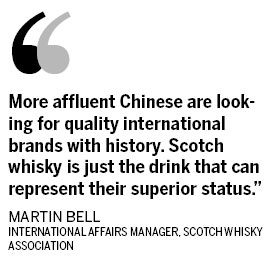Seeking a measure of success
Updated: 2011-11-10 07:56
By Liu Lu (China Daily)
|
|||||||||
BEIJING - Jason Zheng's favorite new drink is green tea with a shot of Chivas Regal blended Scotch whisky.
The image-conscious Beijing sales manager is obsessed with the unique fragrance of the mixture. He says it is a refreshing drink that encapsulates Chinese tradition while sounding impressively modern.
Zheng, 30, is exactly the kind of Chinese customer the Scotch whisky industry is wooing - the young and the rich.
In China, more middle class people like Zheng are developing a taste for the exotic drink with its smoky aroma and high alcoholic content. Rising domestic consumer demand has made China into one of the world's fastest-growing markets for Scotch whisky and encouraged whisky distilleries in Scotland to seek ways into the Chinese market.
 |
Figures published by the Scotch Whisky Association (SWA) show that China's imports of Scotch whisky rose from $2.9 million in 2001 to more than $85 million in 2010, and the annual consumption volume of Scotch whisky in China has jumped from 142,250 nine-liter cases (a case contains 12 nine-liter bottles) in 2000 to 1.72 million cases in 2010.
"Scotland has greatly boosted its whisky exports to China over the past decade as the Chinese get a bigger buzz from it," said Martin Bell, SWA's international affairs manager. He added the export of Scotch whisky to China rapidly increased when China's economy took off after it joined the World Trade Organization in 2001.
Compared with whisky produced by other countries, Bell believes whisky made in Scotland has an unparalleled supremacy in the Chinese market because of its international prestige and more than 500 years of history.
"More affluent Chinese are looking for quality international brands with history. Scotch whisky is just the drink that can represent their superior status," he said.
Bell said although current exports to China are relatively small, accounting for just 3 percent of the liquor's global sales, China is a promising market with enormous business potential.
In China, Scotch whisky has outperformed many other international spirits to become one of the most popular imported alcoholic drinks.
According to Liu Yuan, vice-chairman of the China National Association for Liquor and Spirits Circulation, Scotch whisky now accounts for more than 50 percent of all foreign-produced spirits sold in China by volume and it also has the fastest sales growth rate.
Liu ascribes the unique appeal of Scotch whisky to its similarity in flavor and smoothness with China's national drink, baijiu, a distilled sorghum or rice-based alcoholic beverage that has dominated the Chinese dinner table for thousands of years.
Manufacturers of the Scottish tipple have also attempted to occupy a broader Chinese market by tapping regional markets that possess distinctive consumer power.
People in East China buy more premium whiskies as high as more than 1,000 yuan a bottle, while those in West China tend to buy lower-priced products such as Johnnie Walker Red Label at around 150 yuan a bottle, said Hu Wei, vice-general manager of Beijing Zhong Tang Wines Selling Co Ltd.
Hu said although the sales growth rate of Scotch whisky in West China is not as fast as in the better-off eastern region, some particular western provinces and cities have seen a sales boom in recent years.
However, despite the encouraging sales growth of Scotch whisky across China, industry experts warned distilleries in Scotland to get to know the Chinese market better and to be cautious. "China is such a big country. We are still testing the water," Bell said.
He said compared with the money spent on baijiu and wine, Chinese people's spending on whisky was tiny.
"We need more time and market research to better understand different Chinese regions with their varied market conditions so as to encourage more Chinese to develop an interest in Scotch whisky," he added.
China Daily











